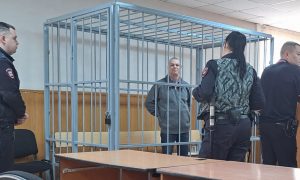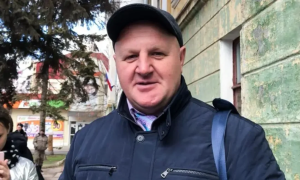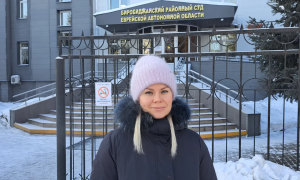Jehovah’s Witness prisoner of conscience, pensioner and cancer-sufferer Teymur Akhmedov was jailed in Astana on 2 May for five years and banned for a further three years from conducting “ideological/preaching activity”. He denied KNB secret police charges of “inciting religious hatred” and will appeal.
On 2 May a Judge in Kazakhstan’s capital Astana sentenced Jehovah’s Witness prisoner of conscience Teymur Akhmedov to five years’ imprisonment for discussing his faith with seven young men who were National Security Committee (KNB) secret police informers but claimed to be students. He was also banned from conducting “ideological/preaching activity in the area of religion” for three years after the end of his sentence, a court statement declared.
Akhmedov rejected the charge of “inciting religious hatred” under Criminal Code Article 174 and will appeal. The Prosecutor had demanded a six year, eight month prison sentence.
Akhmedov, a retired bus driver who marks his 61st birthday on 7 May, has been in pre-trial detention since 18 January, where he was tortured with beatings. Officials have repeatedly refused to allow him to be treated in hospital for the cancer he is suffering from (see below).
The KNB secret police has already launched a criminal case against two of Akhmedov’s lawyers for allegedly violating the secrecy of the case by appealing on their client’s behalf to President Nursultan Nazarbayev (see below).
KNB secret police Investigator Medet Duskaziyev – who launched the cases against Akhmedov and two of his lawyers – refused absolutely to discuss anything with Forum 18 on 3 May. He put the phone down as soon as it had introduced itself.

Asaf Guliyev, arrested with Akhmedov on the same charges in January, was sentenced to five years’ restricted freedom on 24 February in Astana for speaking with Akhmedov about their faith to KNB secret police agents pretending to be students (see F18News 7 March 2017Â http://www.forum18.org/archive.php?article_id=2262).
Five Sunni Muslims have faced criminal prosecution under the same charges of “inciting religious hatred” as Akhmedov and Guliyev after studying their faith in Saudi Arabia. Kuanysh Bashpayev was sentenced to four and a half years’ imprisonment in Pavlodar on 7 April at the end of a closed trial. The closed trial of 27-year-old Nariman Seytzhanov began in Kokshetau in Akmola Region on 25 April. The case of Denis Korzhavin was handed to Almaty’s Almaly District Court on 19 April. No trial date has been set. Satimzhan Azatov remains in pre-trial detention in Astana, while Imam Abdukhalil Abduzhabbarov is in pre-trial detention in Oral (Uralsk) (see F18News 18 April 2017Â http://www.forum18.org/archive.php?article_id=2273).
Seytzhanov’s trial is due to resume on the morning of 11 May (see below).
Azatov’s case might be about to be handed for trial, as Prosecutors do not appear to have applied to extend his pre-trial detention, which expires on 4 May (see below).
Prisoners – both in pre-trial detention and in labour camp – are often denied the right to exercise freedom of religion or belief. An official of Astana’s Investigation Prison where Akhmedov is being held told Forum 18 bluntly that “religious literature is banned” (see below).
Akhmedov: Five year prison term
The KNB secret police alleged that between May and October 2016 Akhmedov and Guliyev insulted the faith of non-Jehovah’s Witnesses as they spoke about their own faith in Astana to young men who turned out to be KNB agents, who secretly video-recorded their conversations. Both men were arrested in 18 January (see F18News 2 February 2017Â http://www.forum18.org/archive.php?article_id=2252).
Teymur Sultan ogly Akhmedov (born 7 May 1956) went on trial at Astana’s Saryarka District Court No. 2 under Judge Talgat Syrlybayev with a preliminary hearing on 27 March. The full trial began on 6 April. In his final summing up, Prosecutor Baurzhan Kulmaganbetov demanded that Akhmedov be imprisoned for six years and eight months.
On 2 May, at the end of the trial, Judge Syrlybayev found Akhmedov guilty of violating Criminal Code Article 174, Part 2. An Astana City Court statement the same day claimed Akhmedov had “in the presence of his followers spoken publicly and negatively in relation to representatives of Islam, Catholicism and Orthodoxy, propagandising the superiority of one religion over another”.
The Judge sentenced Akhmedov to five years’ imprisonment in a general regime labour camp. The Judge also banned him from conducting “ideological/preaching activity in the area of religion” for three years after the end of his sentence, according to the Astana City Court statement.
Bans on exercising freedom of religion or belief after an individual has completed a prison term have become a regular extra punishment. Muslim prisoner of conscience Saken Tulbayev he was sentenced in July 2015 to four years eight months’ imprisonment. He was also banned from exercising freedom of religion or belief, including praying with others and reading the Koran, until the end of 2022 three years after his release (see F18News 8 July 2015Â http://www.forum18.org/archive.php?article_id=2078).
Akhmedov is likely to be added to the Finance Ministry Financial Monitoring Committee List of individuals “connected with the financing of terrorism or extremism”. All known prisoners of conscience convicted under Article 174 have been added to this List, thus freezing any bank accounts they may have, without any additional due legal process. As individuals are not told when they are added to the List, they normally only find out they have been added when they or relatives attempt to withdraw money from their bank (see F18News 10 June 2016Â http://www.forum18.org/archive.php?article_id=2187).
Akhmedov: No release for cancer treatment
Since Akhmedov’s 18 January arrest, officials have repeatedly refused to release him from Investigation Prison to undergo hospital treatment for cancer. A report from the National Scientific Centre for Oncology and Transplantation (the national cancer centre) “recommends an operation and requests that Akhmedov undergo an examination before being hospitalised”.
Akhmedov’s lawyer Kuznetsov told Forum 18 in early April that his client is suffering with two large tumours of the gastro-intestinal tract which are suspected of being cancerous. Akhmedov also told Kuznetsov he was tortured by being beaten in Astana’s Investigation Prison No. 12. The duty officer, an official of the Special Department and the Deputy Head of the Investigation Prison separately claimed to Forum 18 in March that no one is beaten there and one accused Akhmedov of lying (see F18News 3 April 2017Â http://www.forum18.org/archive.php?article_id=2269).
The detention of a cancer sufferer who needs to be hospitalised violates the UN Standard Minimum Rules for the Treatment of Prisoners (known as the Mandela Rules, A/C.3/70/L.3) (see F18News 2 February 2017Â http://www.forum18.org/archive.php?article_id=2252).
The head of Astana’s Public Observers Commission, Ruslan Ozdoyev, visited Akhmedov in prison in late February. He told Forum 18 on 3 May that he had recommended that Akhmedov be immediately sent to hospital for full medical treatment. “I was angered – how can a person be put in pre-trial detention if they already have a condition needing full treatment?”
An official of the Special Department of Astana’s Investigation Prison No. 12, where Akhmedov is being held, refused to discuss his medical condition with Forum 18 on 3 May.
Akhmedov: Proof “ignored”
The seven young men who in 2016 invited Akhmedov and Guliyev to meetings at a rented flat, as well as at the two Jehovah’s Witnesses’ homes, claimed in court to be students of Astana’s Eurasian University. They secretly filmed the meetings and passed the 17 discs of recordings to the KNB secret police.
However, at the hearing on 13 April, at which the “chief witness” was questioned, everyone except for the Prosecutor and Akhmedov’s lawyers were excluded from hearing the testimony. Even Akhmedov was excluded, Radio Free Europe’s Kazakh Service noted. The prosecution claimed the “chief witness” feared for his safety. The defence said it was he who had arranged the invitation to Akhmedov to speak to the young men.
Fellow Jehovah’s Witness Yevgeny Plachenta told Radio Free Europe’s Kazakh Service in the court room after the verdict was handed down that Jehovah’s Witnesses were “angry and shocked” by it.
“Proof put forward by the defence were all ignored, while the Prosecutor and court simply had the aim of convicting him,” he complained. “These were simple religious conversations. He didn’t do anything, didn’t hit anyone, didn’t incite anyone to commit violence.”
Criminal case against Akhmedov’s lawyers
On 16 March KNB secret police Major Duskaziyev opened a criminal case against two of Akhmedov’s lawyers, Natalya Kononenko and Vitaly Kuznetsov (who is from Russia). He is seeking to punish them for appealing about their client’s case to President Nursultan Nazarbayev and other state agencies.
The two lawyers are being investigated under Criminal Code Article 423, which punishes: “Revealing information from a pre-trial investigation by an individual warned under the law of the inadmissibility of information being revealed without the permission of the prosecutor or person undertaking the pre-trial investigation”. Punishments are fines of up to 2,000 Monthly Financial Indicators, or restricted freedom or imprisonment of up to two years.
However, the first time the lawyers themselves knew they were facing a criminal case was when officials told them this during the preliminary hearing of Akhmedov’s criminal trial on 27 March (see F18News 3 April 2017Â http://www.forum18.org/archive.php?article_id=2269).
KNB Investigator Duskaziyev is also accusing Kuznetsov of putting pressure on Guliyev, who testified in Akhmedov’s case. Kuznetsov and Akhmedov’s son Parviz met Guliyev to discuss the case. Guliyev later wrote a complaint to Investigator Duskaziyev against Kuznetsov.
Police have already summoned the two lawyers, Kononenko and Kuznetsov for questioning. The lawyers regard the criminal case against them as further pressure on Akhmedov.
On 3 May Forum 18 was unable to reach police Investigator Ersain (last name unknown), who is investigating the case.
Prisoners denied right to pray, have religious literature
Many prisoners of conscience imprisoned for exercising the right to freedom of religion or belief have complained of being unable to pray visibly in prison or have religious literature. Other prisoners too have complained of these restrictions.
The UN Standard Minimum Rules for the Treatment of Prisoners (known as the Mandela Rules) require governments to respect the freedom of religion or belief and other human rights of prisoners – including those in pre-trial detention.
Prison officials at Oral Investigation Prison refused to accept a copy of the Koran for pre-trial prisoner of conscience Imam Abduzhabbarov.
The administration of Prison camp KA-168/2 in Aktobe refuses to allow Sunni Muslim prisoner of conscience Khalambakhi Khalym to pray visibly. He is allowed to read the Koran only once a week, when prisoners have a lesson on the Koran from an imam of the state-backed Muslim Board, the only Muslim community the government allows to function in the country (see F18News 18 April 2017Â http://www.forum18.org/archive.php?article_id=2273).
Political prisoner Amin Eleusinov, on trial in Astana for his trade union activities, has – like Akhmedov – been held in Astana’s Investigation Prison No. 12. He has been denied the right to pray the namaz in prison, his daughter Milana Eleusinova told Svetlana Glushkova of Radio Free Europe’s Kazakh Service on 26 April. Family members were also not allowed to hand in religious literature for him or a pair of ordinary galoshes, because the prison authorities regarded these as “religious” footwear.
The Special Department official at Astana’s Investigation Prison No. 12, who did not give her name, told Forum 18 bluntly on 3 May: “Religious literature is banned.” She refused to explain why or discuss any other restrictions on detainees’ rights to freedom of religion or belief.
Seytzhanov: Trial continues
In Akmola Region, the closed trial of Muslim prisoner of conscience Nariman Kabdyrakhmanovich Seytzhanov (born 2 May 1989) under Judge Ilyas Kakim continues at Kokshetau City Court. He is on trial under Criminal Code Article 174, Part 1 (“Incitement of social, national, clan, racial, or religious hatred or discord”). A further hearing was held today (3 May), with the next due at 10.00 am on 11 May, according to court records.
Judge Kakim was not available each time Forum 18 called on 3 May. It was therefore unable to find out why he has declared the trial closed.
Seytzhanov – who had studied his faith in Saudi Arabia – was arrested on 15 January. He has been held since his arrest in Kokshetau’s Interior Ministry Investigation Prison No. 20 (see F18News 18 April 2017 http://www.forum18.org/archive.php?article_id=2273).
Azatov: Trial imminent?
In Astana, the trial of Muslim prisoner of conscience Satimzhan Bagytzhanuli Azatov (born 17 September 1989) might be imminent. The latest approval to hold him in pre-trial detention – approved by Astana’s Saryarka Court No. 2 – expires on 4 May. As of the afternoon of 3 May, Prosecutors had submitted no suit to court to have the pre-trial detention extended. Nor had they submitted the case to court for trial, Astana City Court told Forum 18.
Azatov remains in the city’s KNB secret police Investigation Prison. Astana KNB opened a criminal case against him in late December 2016 under Article 174, Part 1 (“Incitement of social, national, clan, racial, or religious hatred or discord”). He had met with other Muslims in Astana without state permission. Arrested on 4 January 2017, he remains under investigation (see F18News 6 February 2017Â http://www.forum18.org/archive.php?article_id=2253).
KNB secret police investigator Senior Lieutenant Nurlan Belesov initiated and investigated the case against Azatov. His telephones went unanswered each time Forum 18 called on 3 May.
Broadly-framed Criminal Code Article 174
Criminal Code Article 174 punishes: “Incitement of social, national, clan, racial, or religious hatred or discord, insult to the national honour and dignity or religious feelings of citizens, as well as propaganda of exclusivity, superiority or inferiority of citizens on grounds of their religion, class, national, generic or racial identity, committed publicly or with the use of mass media or information and communication networks, as well as by production or distribution of literature or other information media, promoting social, national, clan, racial, or religious hatred or discord”.
Article 174, Part 2, which Akhmedov and Guliyev were sentenced under, punishes these actions “committed by a group of persons, a group with prior planning, repeatedly, with violence or threat of violence, or by an official, or by the leader of a public association”. If convicted they face five to 10 years’ imprisonment, “with deprivation of the right to hold specified positions or to engage in specified activity for up to three years”.
All the cases have either been brought by or have the close involvement of the KNB secret police. Secrecy surrounds many of these cases. Lawyers are forced not to reveal information on the cases, hearings are often closed to observers, and prosecution and court officials often refuse to answer questions (see F18News 7 March 2017Â http://www.forum18.org/archive.php?article_id=2262).
The then United Nations (UN) Special Rapporteur on the rights to Freedom of Peaceful Assembly and of Association, Maina Kiai, as well as the UN Human Rights Committee and Kazakh human rights defenders have strongly criticised the broad and unclear formulation of Article 174 and other laws, as well as the prosecution of a wide range of individuals under Article 174 (see F18News 2 February 2017Â http://www.forum18.org/archive.php?article_id=2252).
http://www.forum18.org/archive.php?article_id=2277Â





